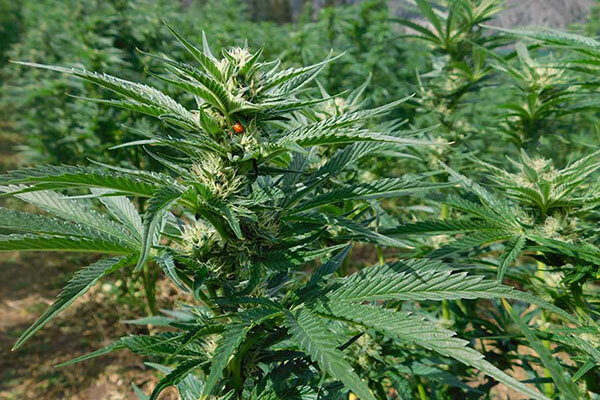

By Veronica Stracqualursi and Lauren Dezenski, CNN
(CNN) — The House of Representatives has approved legislation that would decriminalize marijuana and seek to “address the devastating injustices caused by the War on Drugs.”
Friday’s vote in the Democratic-led House is the first time a chamber of Congress has voted on federal marijuana decriminalization. It has little chance of passing the Republican-led Senate, however.
The bill passed largely along party lines: 222 Democrats, five Republicans and Rep. Justin Amash, a libertarian, voted in support while 158 Republicans and six Democrats voted against.
The Republicans who voted for the bill are Florida Rep. Matt Gaetz, the bill’s co-sponsor, as well as Reps. Brian Mast of Florida, Tom McClintock of California, Denver Riggleman of Virginia and Don Young of Alaska. The Democrats against were Reps. Cheri Bustos and Dan Lipinski of Illinois, Henry Cuellar of Texas, Conor Lamb of Pennsylvania, Chris Pappas of New Hampshire and Collin Peterson of Minnesota.
“Millions of Americans’ lives have been upended as a result of convictions for possessing small amounts of marijuana, and the racial disparities in conviction rates for those offenses are as shocking as they are unjust,” House Majority Leader Steny Hoyer, a Maryland Democrat, said in a statement after the vote. “That’s why we passed the Marijuana Opportunity Reinvestment and Expungement (MORE) Act today.”
The MORE Act would remove marijuana from the Controlled Substances Act and eliminate criminal penalties for individuals who manufacture, distribute or possess marijuana. It also includes creating a process to remove prior convictions, known as expungement, and conduct sentencing review hearings for federal cannabis offenses.
The measure would also authorize a 5% sales tax on marijuana products to invest in services such as job training, legal aid and substance abuse treatment for individuals adversely impacted by the war on drugs. The tax revenue would also provide funds for small businesses loans and allow access to marijuana licensing and employment for economically disadvantaged individuals.
Republican Senate Majority Leader Mitch McConnell this week criticized the House for moving on the bill instead of passing parts of the Covid-19 stimulus bill that both parties agree on.
“The House of Representatives is spending this week on pressing issues like marijuana. You know, serious and important legislation befitting this national crisis,” McConnell said sarcastically on the Senate floor.
Critics of the bill cite the lack of potential traction in the Senate.
“It’s an unserious bill that was voted on in an unserious manner and we rest easily knowing there is zero interest in moving this bill in the Senate and zero interest in supporting it in either the current administration or the incoming one,” Kevin Sabet, president and co-founder of Smart Approaches to Marijuana, which opposes marijuana legalization, said in a statement.
The House bill was introduced by Judiciary Chair Jerry Nadler last July.
“I have long believed that the criminalization of marijuana has been a mistake, and the racially disparate enforcement of marijuana laws has only compounded this mistake, with serious consequences, particularly for communities of color,” Nadler said in a statement Friday before the vote.
California Democratic Sen. Kamala Harris, now the vice president-elect, has introduced a companion bill in the Senate, but it has been stuck in the Republican-controlled Senate Finance Committee.
President-elect Joe Biden supports decriminalizing marijuana and the automatic expungement of prior criminal records for marijuana possession, but not full legalization of the substance, a Biden campaign spokesman said last year.
“He would allow states to continue to make their own choices regarding legalization and would seek to make it easier to conduct research on marijuana’s positive and negative health impacts by rescheduling it as a schedule 2 drug,” Andrew Bates, who is now a spokesperson for the Biden transition, told CNN.
Despite still being illegal federally, states have legalized marijuana and stood up their own regulated markets since 2012 without major federal hindrance. Both former President Barack Obama and President Donald Trump’s administrations did not interfere with states’ legalized markets.
This fall, five additional states voted to legalize marijuana, either for medicinal or recreational purposes, or both, bringing the current national total to 15 states where recreational use and 36 states where medical use are legal, according to the National Conference of State Legislatures.
Even more states are eyeing legalization in the coming years, including New York, New Mexico, Connecticut and Pennsylvania.
more recommended stories
 Fentanyl Seizures at Border Continue to Spike, Making San Diego a National Epicenter for Fentanyl Trafficking
Fentanyl Seizures at Border Continue to Spike, Making San Diego a National Epicenter for Fentanyl TraffickingFentanyl Seizures at Border Continue to.
 Utah Man Sentenced for Hate Crime Attack of Three Men
Utah Man Sentenced for Hate Crime Attack of Three MenTuesday, August 8, 2023 A.
 Green Energy Company Biden Hosted At White House Files For Bankruptcy
Green Energy Company Biden Hosted At White House Files For BankruptcyAug 7 (Reuters) – Electric-vehicle parts.
 Former ABC News Reporter Who “Debunked” Pizzagate Pleads Guilty of Possessing Child pδrn
Former ABC News Reporter Who “Debunked” Pizzagate Pleads Guilty of Possessing Child pδrnFriday, July 21, 2023 A former.
 Six Harvard Medical School and an Arkansas mortuary Charged With Trafficking In Stolen Human Remains
Six Harvard Medical School and an Arkansas mortuary Charged With Trafficking In Stolen Human RemainsSCRANTON – The United States.
 Over 300 People Facing Federal Charges For Crimes Committed During Nationwide Demonstrations
Over 300 People Facing Federal Charges For Crimes Committed During Nationwide DemonstrationsThe Department of Justice announced that.
